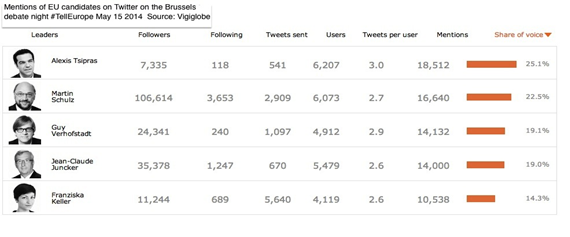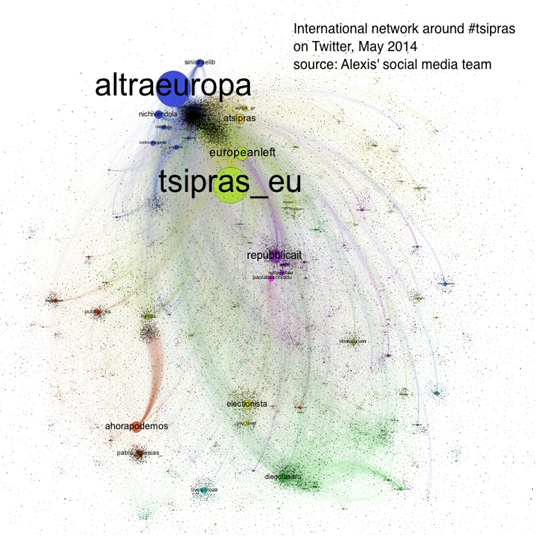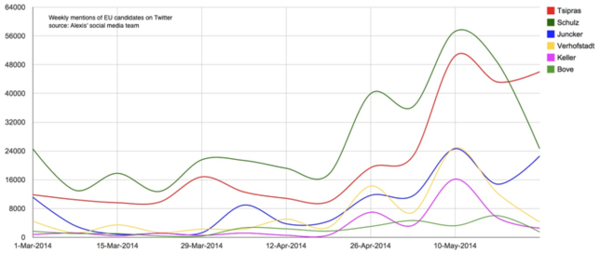On 30 April we called upon European comrades, through the transform!europe network to mobilize online aiming to gain a critical mass of support for Alexis Tsipras as candidate of the European Left for the presidency of the European Commission. The campaign only managed to fulfil part of its goals but both the theory and the methods proved to be right.
Here we will make a short account of the campaign and try to draw some perspective for the future. An extended analysis will be presented at the Summer University of the European Left in Werbellinsee on 26 July.
Why Social Media was the key?
The main presupposition was that the dominant media such as mainstream TV channels and newspapers would downplay the campaign of the European Left both in the national and European level. Indeed, media conglomerates are linked to the financial and political establishment and tend to dismiss our proposals as non-pragmatic, unrealistic and even extremist. In France and Italy for instance our comrades of the Front de Gauche and Altra Europa were marginalised in the mainstream media and in Greece propaganda against Syriza was once again massive.
Consequently, the social media campaign team of Alexis Tsipras made the following assumptions:
– The internet was the only medium allowing to reach people across borders and throughout the EU.
– Social media were going to be used largely by EU institutions in their effort to create a virtual space of political dialogue for these elections.
– Alexis’ campaign needed to base itself on grassroots methods in order to fight against the well paid and professionally organized campaigns of his adversaries.
– Occupy Wall Street and Indignados had taught us that it is feasible to connect virtual mobilization to physical political spaces and events.
– A critical mass of online users spreading Alexis’ message could provide an alternative to mass media exclusion.
Winning the elections online
The decision to rely essentially on the internet throughout the campaign in order to raise awareness not only for Alexis’ candidacy but for the whole of the European Left proved to be right. By doing so Alexis’ campaign team produced a heritage that could constitute the basis upon which the European Left could build further success in the future.
Indeed, Alexis was the most discussed and commented candidate on the web (see here, here and here for analysis). We think that this online efficiency, combined to the overall political dynamics of the campaign – that saw the rise of a growing popular demand for an end to austerity policies through Europe –, was the main reason for the electoral success of the European Left.

An online strategy for the Left
The strategy of Alexis’ campaign on the web was based on two main axes: first, using grassroots methods in tone with social movements in order to generate spontaneous participation; second, coordinating as much as possible efforts internationally. So Alexis’ accounts on Twitter and Facebook, and to a lesser extend his homepage, were only the central hubs that connected the official, personal and unofficial accounts of as many as possible drawing the online map of the European Left.

Alexis’ image was used to amplify the message of comrades through Europe. In essence it was not just local campaigns supporting one candidate, but also the candidate supporting all local campaigns and urging comrades from different countries to support each other through constant interconnection and occasional transnational events online. For example #primalapersone was the slogan under which Altra Europa run in Italy but it quickly leaked in different Twitterspheres all over Europe. When Angela Merkel visited Athens again we campaigned in different countries under #wearealltroublemakers and so on.
A decentralized model of coordination
The work that was done in trying to create a common conscience among activists, supporters and party members crystallized during the night of the debate that took place on 15 May in Brussels. The European Left managed to dominate not only in the discussion that was taking place inside the European parliament through the admittedly excellent presence of Alexis Tsipras, but also online, turning the live polling of social media on our side and presenting concrete dedication among our supporters. It was exemplary to see how both our official and unofficial networks coordinated to “hack” the event and of course it did not happen by chance.


The work done in the periphery of this hybrid electoral field affected the media, the perception of European voters of the Left in general and Alexis Tsipras in particular and probably influenced the whole electoral process. The radical Left’s campaign presented itself as grassroots, fresh, young and pro-European in a field of exclusions, doubts and scepticism. It formed a transnational framework that enhanced national campaigns and, at the same time, benefited in a European level from local actions. It managed to aggregate authentic communities around official accounts and relate to social movements such as the #Vote4water initiative against the privatization of water in the city of Thessaloniki.
A lot has to be done in order to establish perennial and solid links between different parties, movements and initiatives throughout Europe. The European Elections online campaign of 2014 should serve as a guide and as an inspiration for further action in order to bring about another Europe. That’s because, if our opponents own the media, we can take over the internets.
Co-author: Nikos Smyrnaios, social scientist and media theorist. He contributed with data and analysis.
All data were processed by Nikos Smyrnaios and Pavlos Kazakopoulos.